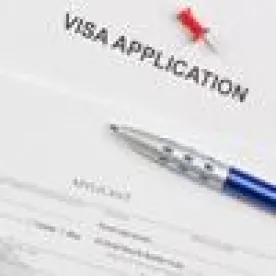On April 1, 2015, the U.S. Citizenship and Immigration Services (USCIS) will begin accepting H-1B visa petitions subject to the legislatively prescribed annual numerical limitations. As in years past, 65,000 H-1Bs will be available for employees with a U.S. bachelor’s degree (or the equivalent), while 20,000 H-1Bs will be reserved for employees with a U.S. master’s degree or higher. Based on current U.S. employment levels and other strong economic data, we expect that, by the end of the first week of April, the USCIS will have received enough H-1B petitions to meet the 65,000 and 20,000 quotas, leaving employers unable to file new H-1B petitions until April 1, 2016.
Accordingly, we are advising employers to make H-1B sponsorship decisions within the next few weeks so there is ample time prior to April 1st to prepare job descriptions, organize wage and compensation information, collect academic documents and, where appropriate, secure translations and evaluations of education/experience.
As a reminder, a foreign worker is eligible for an H-1B visa if he or she will be employed in a role that requires a specific bachelor’s degree and the foreign worker possesses that degree (or its equivalent). H-1B employers must also attest that they will pay H-1B employees the same salary and benefits packages normally offered to U.S. workers and are required to observe the H-1B program’s public notice and recordkeeping requirements. Please remember that approved H-1B petitions filed on April 1, 2015 will become valid no earlier than October 1, 2015.
Presidential Executive Action
On November 20, 2014, President Obama announced changes to our current immigration system. A number of these changes will affect employers throughout the United States. The most striking provision of the Immigration Accountability Executive Action plan will provide temporary immigration benefits to the parents of children who are U.S. citizens or lawful permanent residents (LPRs). Although details are not yet available, below is a brief description of the changes most important to businesses, entrepreneurs and STEM graduates:
-
As many employers know, it has been very difficult to transfer employees to the United States through the L-1B Intracompany Transferee (Specialized Knowledge) category. USCIS has been tasked with bringing greater consistency to the L-1B visa program by preparing “clear, consolidated guidance on the meaning of specialized knowledge.”
-
STEM employees currently working in F-1 Student status pursuant to Optional Practical Training (OPT) will be able to extend their OPT authorization period for more than the 29 months now allowed.
-
Some spouses of employees in H-1B (Specialty Occupation) status will be able to apply for work authorization. The final regulations have yet to be published, but it is expected that this benefit will be available to employees and their spouses in the process of obtaining LPR status.
-
Employers/employees in the process of applying for LPR status will be able to “pre-register” for “Step 3” of the process (adjustment of status) as soon as Step 2 (Form I-140) has been approved. This means that spouses and children under 21 will be able to obtain work authorization years before they are currently eligible. For those backlogged the most (Indian nationals in EB-3 status), the wait for work authorization would move from 11 years to less than 12 months.
-
Two types of benefits are proposed for certain entrepreneurs: (a) inventors, researchers and founders of start-up enterprises may be eligible for a type of “parole” that allows them to temporarily pursue research and development of promising new ideas and businesses in the United States; and (b) entrepreneurs working in fields or businesses that provide “significant public benefit” may be eligible for LPR status without going through a test of the labor market by utilizing the Employment-Based Second Preference (EB-2) category, reducing the backlog times from 11+ years to one year, if they qualify.
Please note that NONE of these proposed changes are yet in place. Most of the details, requirements and time frames have not yet been published, and may be affected by future Congressional action. We will continue to keep you apprised of changes of benefit to our clients on a regular basis.
J-1 On-Site Inspections
In an e-mail to sponsors, the Department of State has announced that it will start conducting on‑site inspections of J-1 internships and training programs. The e-mail did not specify many details about these inspections, but sponsors should expect officials to begin making unannounced visits, during which officials will interview program participants and supervisors to ensure compliance. USCIS already conducts on-site “visits” to employers sponsoring employees for the H-1B and L-1 categories.
California to Issue Driver’s Licenses for Undocumented Foreign Nationals
Beginning in January 2015, undocumented foreign nationals are permitted to apply for a California Driver’s License under AB 60—a new law requiring the California Department of Motor Vehicles to issue a driver’s license to individuals who can provide proof of identity and California residence. They will also need to meet all other licensing requirements, including passing the written test and behind-the-wheel exam.
With this new law, California joins Connecticut, Colorado, Maryland, Oregon, New Mexico, Illinois, Washington, Nevada and Utah, as well as Washington, DC in allowing undocumented foreign nationals to legally drive, which will allow and require them to obtain insurance.
India’s New Electronic Visa
India recently introduced an E-Visa (online visa) for 43 countries including the U.S., Australia, Japan, Israel, Germany and Singapore. The new online system will allow travelers to apply for a visa from the comfort of their homes and receive it within 72 hours. A traveler must apply for this visa at least four days prior to entry into India and will only be eligible for two of these visas within a calendar year.
U.S. and China to Extend Visas for Short-Term Business Travelers, Tourists and Students
The United States began issuing visas in accordance with a new reciprocal arrangement with China on November 12, 2014. The U.S. and China were previously issued visas in only one-year increments. Chinese applicants who qualify for a B-category nonimmigrant visa (NIV) may now be issued multiple-entry visas for up to 10 years for business and tourist travel. Qualified Chinese students and exchange visitors and their dependents who qualify for F-,M- or J-category visas are now eligible for multiple-entry visas valid for up to five years or the length of their program. U.S. citizens eligible for Chinese short-term business and tourist visas should also receive multiple-entry visas valid for up to 10 years, while qualified U.S. students may receive student residency permits valid for up to five years, depending on the length of their educational program.
Justice Department Settles Discrimination Cases in California and Georgia
The U.S. Department of Justice (the DOJ) recently settled several immigration-related discrimination claims in California and Georgia. As you know, the Immigration and Nationality Act requires that employers check the work authorization status of new employees, and employ only persons with work authorization. However, employers must ensure that they do not discriminate against workers in this process.
The agreements resolve claims filed with the DOJ’s Office of Special Counsel for Immigration-Related Unfair Employment Practices (the OSC), that the company engaged in discriminatory documentary practices during the employment eligibility verification process.
The employer “re-verified” an employee’s LPR card when it expired. The OSC noted that the Immigration and Nationality Act’s antidiscrimination provision prohibits employers from making additional and unauthorized documentary demands based on citizenship status or national origin when verifying or re-verifying an employee’s employment eligibility.
In Georgia, the DOJ reached an agreement resolving a claim that the company engaged in discriminatory documentary practices during the employment eligibility verification process.
The DOJ’s investigation found that the employer required non-U.S. citizens to produce specific documentary proof of their immigration status when verifying their employment eligibility. “Employers must make sure that they are not erecting unlawful discriminatory barriers in their employment eligibility verification policies and practices,” said Molly Moran, Acting Assistant Attorney General for the Civil Rights Division.
New Requirements for Russian Citizens Residing Overseas
Effective August 4, 2014, Russian citizens are required to notify the Russian Federal Migration Service (the FMS) if they obtain a residence permit or citizenship overseas. The notification requirement will apply to all Russian citizens, including those living in Russia and abroad, except those who demonstrate that they will permanently reside abroad by either obtaining a de-registration stamp in their Russian passport or by confirming their address abroad as their formal address (using a document known as Listok Ubitia).
Russian citizens who fail to notify the FMS within 60 days of obtaining a residence permit or citizenship in another country will be subject to criminal fines between RUB 200,000 and one-year’s salary and up to 400 hours of compulsory labor. Administrative fines between RUB 500–1,000 may be imposed for paperwork violations. Although we have not yet seen any enforcement of these new requirements, employers are advised to make all Russian citizens who are employed outside of Russia aware of the notification requirement.
UK Registered Traveler Scheme Extended
The UK has extended the Registered Traveler Scheme for migrants from Australia, Canada, Japan, New Zealand and the U.S. who travel to the UK frequently (at least four times a year). Following a successful pilot, 5,000 highly valued travelers in a variety of categories are eligible to apply, including business visitors and tourists.
Undocumented Workers Protected by the FLSA
The U.S. Department of Labor continues to enforce the Fair Labor Standards Act (the FLSA) with regard to work performed by undocumented workers. Agency officials are of the view that employers must pay at least the required FLSA minimum wage and overtime compensation for the work performed by individuals in the U.S., even if they were not legally authorized to do that work. Moreover, as recently as last year, the Eighth and Eleventh Circuit U.S. Courts of Appeals ruled that undocumented workers may sue to recover the wages the FLSA requires to be paid for their work.



 />i
/>i

